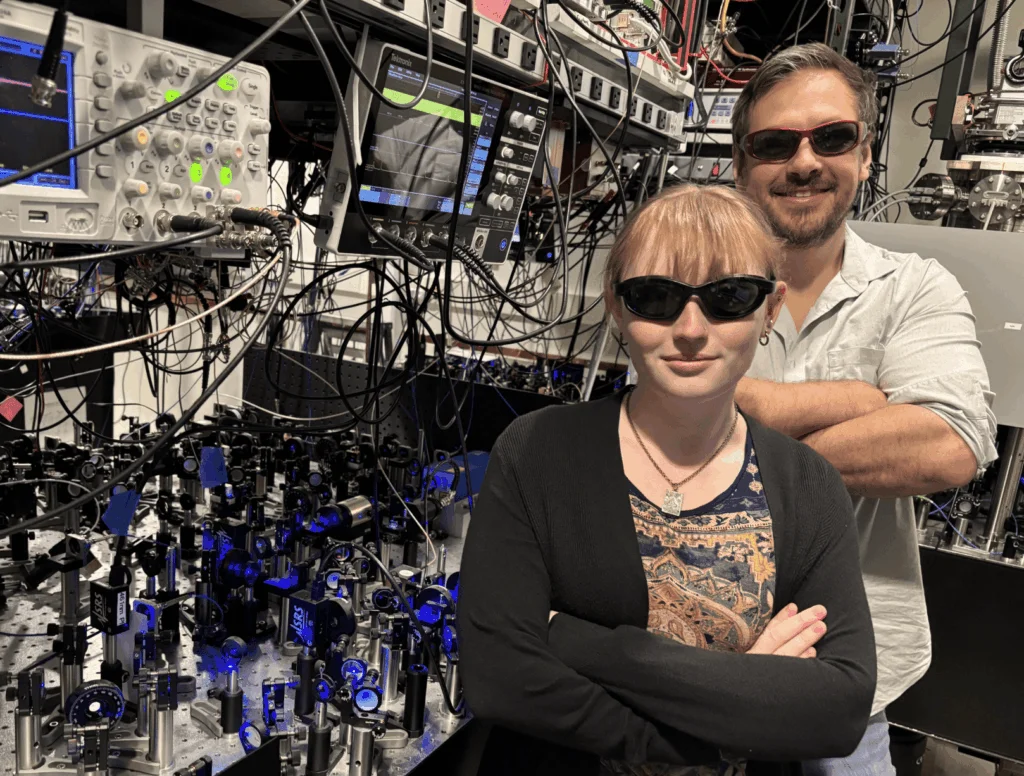Guest Post by
Guy Ward Jackson, Senior Science & Technology Policy Analyst, Tony Blair Institute.
“Nature isn’t classical, dammit, and if you want to make a simulation of nature, you’d better make it quantum mechanical”.
As anxieties around artificial intelligence hitting a wall are making market bulls think twice, the words of the American physicist Richard Feynman echo more truthfully than ever. If we want to use computation to master nature and solve the world’s biggest problems – from drug discovery to languid public services – we can’t just pray that AI will do this all for us. Quantum offers the chance for us to rethink how we compute in the first place.
But while the UK races to catch-up on AI, it’s taking its eye off the ball on this next big technological wave.

Two recent developments in quantum markets highlight the UK’s conundrum. In September, Finland’s leading quantum computing firm, IQM, raised a £320m Series B round to scale its systems. In June, Oxford Ionics — one of the UK’s brightest quantum computing hopes — was bought by the US company IonQ in a billion-dollar deal. The result: Finland has turbocharged its national quantum champion, while Britain has lost one of its own.
This is a tale of two strategies. Finland has built a quantum industry. Britain has built a quantum research programme. Unless we change course, the UK will again nurture world-class science only to see commercial value captured elsewhere.
Government intervention is essential. Quantum sits squarely in the category of markets where the government must play an active industrial role. They are capital-intensive, pre-commercial, and strategically vital — underpinning breakthroughs in energy, materials and, crucially, artificial intelligence. Within a decade, large-scale quantum computers are expected to break today’s encryption standards. The first nations to reach that threshold will wield enormous economic and security advantages.
On paper the UK is doing well. It hosts the third best quantum research base in the world, the second highest level of venture capital investment, and the second highest number of pure-play (solely focussed) quantum companies in the world.
But the familiar pattern that haunts many UK sectors persists: excellence in research, weakness in scale-up and commercialisation. Britain lacks the translational infrastructure and early-stage demand to bridge the gap from lab to market. Our best firms are looking abroad. Oxford Ionics is gone; Universal Quantum has opened in Hamburg, buoyed by a £70mn German government contract — more than double the value of any comparable UK procurement; Bristol-spinout PsiQuantum is now scaling in the United States.
Meanwhile, the UK’s “quantum stack” — the full set of components and supply chains needed to build and scale quantum systems, from cryogenics and lasers to advanced packaging — is worryingly thin. Germany, Finland, Denmark, and the Netherlands have all invested far more heavily in this industrial base. As with AI, Britain risks becoming the largest quantum ecosystem without its own infrastructure.
The next phase of policy must therefore shift from research to commercialisation. That means four things.
First, fund applied engineering research to bridge academia and industry — focussed on overcoming bottlenecks to deployment and commercialisation. This research should focus both on “translational” research, such as qubit error correction to overcome barriers to scale, or enabling research into components, like cryogenic wiring. Finland’s technical research institute, VTT, which is partnering with IQM to build a quantum computing system for the Finnish government, offers a valuable precedent.
Second, the UK must mobilise scale-up capital. The debate around UK pensions – most recently marked by Mansion House II in July – needs to move from asset allocation benchmarks towards actually mobilising scale-up capital through British Business Bank to bet on national winners. Third, the government must put its money where its mouth is and provide large, visible procurement contracts to build out quantum system, providing market pull for proto-sovereign champions – of the kind issued by Berlin’s Aerospace Centre.
Finally, to ensure that the UK does not become the largest quantum ecosystem in the world without its own infrastructure, the government needs to seriously consider investing in domestic capacity for things like testing facilities, advanced packaging, and cryogenics infrastructure – while partnering with allies where domestic investment is economically inefficient.
The stakes are higher than the fate of just one technology. The broader point is this: if the UK fails to build industries of the future, the value of technological change will be captured elsewhere and the only impact the UK will be left with is shrinking legacy sectors and job displacement.
If the UK missed the opportunity to lead in artificial intelligence, quantum offers a second chance. It would be a mistake to repeat another experiment under the same conditions.
Guy is a Senior Science & Tech Analyst at the Tony Blair Institute (TBI), with a focus on UK technology industrial strategy and economic security. He is the lead author of TBI’s recent UK Quantum Industrial Strategy paper.
Photo by phamduyson on Pixabay















